Do I Remain in Solitude or Condemn Another? (EN/ES)
Good day, CineTv friends!
Have you ever seen a very good person do something terrible? Well, there are noble-hearted individuals who are forced to make dark decisions. This is what happened to Jim (Chris Pratt) in Passengers (2016). He was tormented by the question: Should I remain (and die) alone for the rest of the journey, or condemn a girl to live by my side and share this irreversible fate? This red flag, this dark secret, hangs like a Sword of Damocles throughout the entire film, threatening both the protagonist and the viewer.
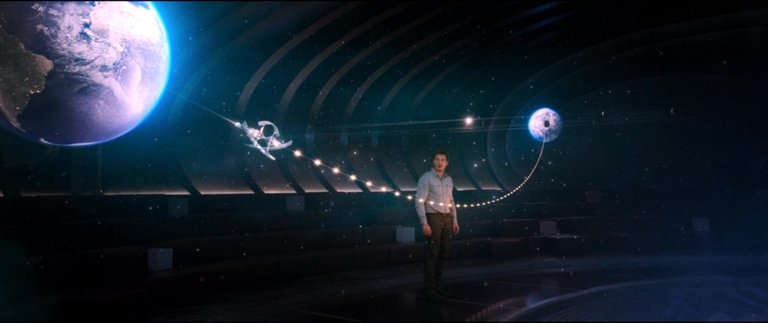
The Journey to a New Life
The Homestead Company sends a group of people with various professions from Earth to Homestead II, the fourth planet in the Bhakti system, to restart a life that for many sounds like founding times and paradise.
Ninety years before reaching their destination, the ship's central computer malfunctions, and one of the hibernation pods fails and opens. This technical error results in Jim waking up prematurely.
The Avalon space transporter, like a luxury hotel, is full of amenities. It even offers the service of Arthur (Michael Sheen), a friendly android who works as a bartender and can hold a pleasant conversation.
However, after a year of solitude à la Robinson Crusoe, our hero's mind begins to deteriorate. There are 90 years left until arrival, and he can't leave the ship or be rescued. Communicating with Earth base to fix the malfunction isn't an option either.
Then he realizes that many sleeping people are on the ship... who could be woken up.
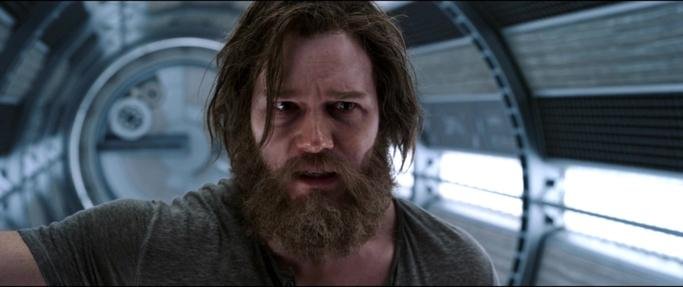
Poison in the Cyclical Mind
This is where the doubt attacks him, the circular inner conflict I referred to at the start of this post.
In his desperation, Jim, who is a mechanic by trade, chooses to sabotage the pod where Aurora (Jennifer Lawrence) sleeps, causing her to wake up "accidentally." He chooses to exorcise the solitude to which he would be condemned if he didn't act that way. But that decision implies hiding a skeleton in the closet.
So the beautiful romantic relationship that follows is built upon a lethal lie.
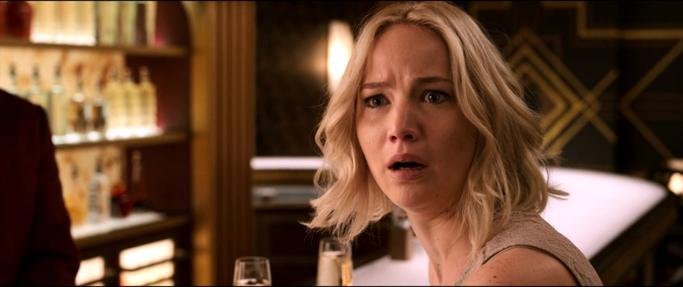
The sweet scenes typical of any romance's beginning contain, in contrast, this poisoned suspense, this red flag that unsettles the viewer: when and how will she find out the truth?
Although it's space science fiction and the protagonists are involved in an extreme situation, Passengers is more accurately classified as a romantic drama with a happy ending. But genre labels are the least important thing.

Who wants to sleep on a beautiful day like this?

The screenwriter's (Jon Spaihts) narrative success in using what Polti called "fatal imprudence" (in this case, the innocent android revealing the secret) leads to a climactic moment, a memorable scene where the roles are reversed in a terrifying and decisive instant, causing emotional catastrophe. From there, a greater catastrophe – also prepared plausibly in the screenplay's dramaturgy – will be needed for reconciliation between the couple to occur.
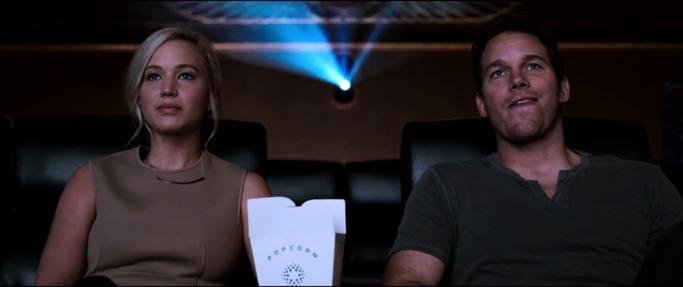
Extrapolating a little, the film can lead to reflection or debate about whether it's healthy or balanced to start a romantic relationship if a warning sign, a red flag, is noticed from the beginning.
I think any "mismatched couple" can work as long as both participants accept the confluence or functionality of their roles, based on the expectations they have of each other. Especially if there is awareness of the other person's needs and, consequently, the power to decide whether to accept them or not.
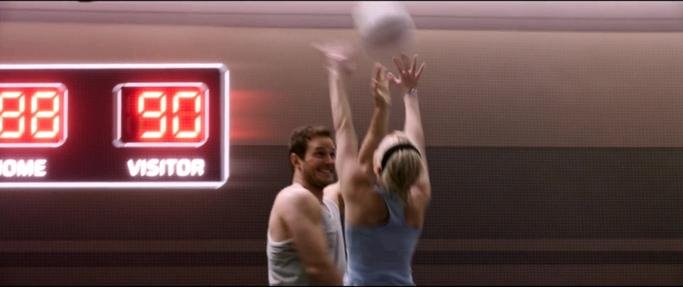
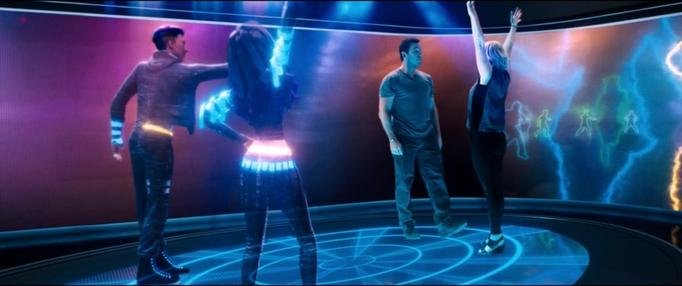
The film has a quick sequence, with a strong dose of black humor, that reflects the progressive desperation afflicting Jim's mood and mind: before condemning Aurora to a wakefulness with no return, he asks himself the same question over and over, refuses to commit his crime, but also neglects his personal hygiene, grooming, and almost all the daily habits that define him as a social being.
Later, because of her understandable resentment, she won't forgive him for that decision, but will become aware of his motivations when a fourth character who appears briefly, Captain Gus (Laurence Fishburne), tells her: "You're right, Aurora. But when a man's drowning, he'll grab anybody. It ain't right, but he was drowning."
This emotional flow (extreme need -> crime -> awareness of the need -> forgiveness) gives the film a dramatic intensity that illuminates the recesses of the human soul and instinct.

I believe the red flag, the dark secret that runs through almost the entire work, could serve as a warning for our own lives, for our personal experiences, if we ever find ourselves at the difficult crossroads of having to choose between two irreversible evils.
All frames are screenshots taken by me during the viewing of the film.

¿Permanezco en soledad o condeno a otro?
Buen día, amigos de CineTv
¿Has visto a una persona muy buena haciendo algo terrible? Bueno, hay personas de noble corazón que deben tomar decisiones oscuras. Así ocurrió a Jim (Chris Pratt) en Passenger (2016). Lo atormentó la pregunta: ¿Debo quedarme (y morir) en soledad el resto del viaje, o condeno a una chica a vivir a mi lado y compartir lo irreversible? Esta bandera roja, este secreto negro, amenaza como una espada de Damocles, durante toda la película, tanto al protagonista como al espectador.

El viaje a la nueva vida
La compañía Homestead envía un conjunto de personas de diversos oficios desde la Tierra hacia Homestead II, cuarto planeta del sistema Bhakti, a fin de recomenzar una vida que para muchos suena a tiempos de fundación y paraíso.
Noventa años antes de llegar a su destino, la computadora central de la nave sufre un desperfecto y una de las cápsulas de hibernación se descompone y abre. Este error técnico tiene como consecuencia el despertar anticipado de Jim.
El transportador espacial Avalon, como un hotel de lujo, está lleno de comodidades. Incluso ofrece el servicio de Arthur (Michael Sheen), un simpático androide que oficia como barman y puede sostener una plática agradable.
Sin embargo, al transcurrir un año de soledad a lo Robinson Crusoe, la mente de nuestro héroe comienza a deteriorarse. Faltan 90 años para llegar al destino y no puede salir de la nave ni ser rescatado. Tampoco es una opción comunicarse con la base terrestre para arreglar el desperfecto.
Entonces se percata de que en la nave viajan muchas personas dormidas que... pudieran despertar.

Veneno en la mente cíclica
Ahí le ataca la duda, el conflicto interior, circular, al que me refería en el inicio de este post.
En su desesperación, Jim, quien es mecánico de oficio, elige descomponer la cápsula donde duerme Aurora (Jennifer Lawrence), y hacerla despertar "accidentalmente". Elige exorcizar la soledad a que estaría condenado si no actuara de esa manera. Pero tal decisión implica meter un cadáver en el armario.
De modo que la bellísima relación amorosa que le sigue a continuación está erigida sobre una mentira letal.

Las dulces escenas de todo inicio de romance contienen, en contraste, ese suspenso envenenado, esa bandera roja que inquieta al espectador: cuándo y cómo se enterará ella de la verdad.
Aunque se trata de ciencia ficción espacial y los protagónicos están involucrados en una situación límite, Passengers clasifica más bien como un drama romántico con final feliz. Pero las etiquetas genéricas son lo de menos.

¿Quién quiere dormir en un precioso día como este?

El acierto narrativo del guionista (Jon Spaihts) al usar lo que Polti llamó "imprudencia fatal" (en este caso la revelación del secreto por parte del inocente androide), conduce a un momento clímax, a una escena memorable donde los roles se invierten por un momento terrorífico y determinan la catástrofe emocional. A partir de ahí se necesitará una catástrofe mayor -también preparada de forma verosímil en la dramaturgia del guión- para que opere la reconciliación entre la pareja.

Extrapolando un poco, la película puede conducir a la reflexión o al debate sobre si resulta sano o equilibrado comenzar una relación amorosa si se advierte desde un inicio una señal de alerta, una bandera roja.
Pienso que cualquier "pareja dispareja" puede funcionar siempre que ambos participantes acepten la confluencia o funcionalidad de los roles, basados en las expectativas que tienen uno del otro. Sobre todo si se tiene conciencia de las necesidades de la otra parte y en consecuencia, se tenga potestad para decidir si aceptarlas o no.


En el filme hay una rápida secuencia, con mucho de humor negro, que refleja la desesperación progresiva que padece el ánimo y la mente de Jim: antes de condenar a Aurora a un despertar sin retorno, él se repite la misma pregunta una y otra vez, se niega a cometer su delito, pero también descuida su aseo personal, su higiene, y casi todos los hábitos cotidianos que lo definen como ser social.
Después, por causa de su comprensible rencor, ella no le perdonará tal decisión, pero sí tomará conciencia de sus motivaciones cuando un cuarto personaje que aparece brevemente, el capitán Gus, (Laurence Fishburne), le señala: "Tienes razón, Aurora, pero cuando una persona se ahoga intenta arrastrar a alguien con él. No está bien, pero él se estaba ahogando".
Este flujo emotivo (necesidad extrema - delito - conciencia de la necesidad - perdón) confiere al largometraje una intensidad dramática que ilumina los recovecos del alma y del instinto humanos.

Considero que la bandera roja, el oscuro secreto que atraviesa casi toda la obra pudiera indicar una alerta para nuestras propias vidas, para nuestras experiencias personales, si en algún momento estuviéramos en la difícil encrucijada de tener que elegir entre dos males irreversibles.
Todos los fotogramas son capturas de pantalla hechas por mí durante la visualización del filme

Moral dilemmas are what make movies interesting and engaging. Good review! !BBH
La pude ver y me gustó mucho. Gracias por tu manera de hacernos reflexionar y hacerme volver la mirada sobre el filme.
Awesome review, I watched this movie before, I really enjoyed it too
Excelente análisis sobre los códigos implícitos en esta película que disfruté en su momento.
Gracias por compartirnos esta lectura que nos lleva a reflexionar nuevamente sobre ello.
¿Sabes? La ví, o la comencé a ver varias veces y ahora mismo no recuerdo haber visto el final, pero sí la degradación del personaje casi a la locura y sobre todo el cómico androide que sirve en el bar. Ahora, realmente el análisis que haces es casi mejor que la película, esa nueva teoría de las banderas rojas al inicio de una relación tiene su cosa, muchas veces son simples ondulaciones de tiempo-espacio y no banderas rojas, ni alarmas... Pero bueno, la verdad, tú reseña es tan o más disfrutable que el filme. Gracias 🫂
Buen filme, mucho que lo disfruté. Gracias por traerlo acá.
Definitivamente es una película con un gran gancho y, como bien dices, el aspecto reflexivo se extiende y aplica a nuestras vidas 👏🏻👏🏻👏🏻👏🏻
@ernestopg, I paid out 0.187 HIVE and 0.041 HBD to reward 6 comments in this discussion thread.